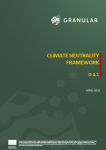Damari Y., Berchoux T., Tapia C. (2025). Climate neutrality framework. 184 p. + annexes. Deliverable D4.1 - GRANULAR project.
https://doi.org/10.5281/zenodo.15482159
https://doi.org/10.5281/zenodo.15482159
| Titre : | Climate neutrality framework |
| Auteurs : | Y. Damari ; T. Berchoux ; C. Tapia |
| Type de document : | Rapport, Expertise, Working Paper |
| Année de publication : | 2025 |
| Format : | 184 p. + annexes |
| Note générale : | Deliverable D4.1 - GRANULAR project |
| Langues : | Anglais |
| Langues du résumé : | Anglais |
| Catégories : |
Catégories principales 07 - ENVIRONNEMENT ; 7.1 - Généralités. Situation EnvironnementaleThésaurus IAMM NEUTRALITE CLIMATIQUE ; CADRE ; COMMUNAUTE RURALE ; INDICATEUR ; AIDE A LA DECISION ; RECOMMANDATION ; STRATEGIE ; RESILIENCE ; POLITIQUE GOUVERNEMENTALE ; POLITIQUE PUBLIQUE ; ZONE RURALE |
| Résumé : |
This document (Deliverable D4.1 - GRANULAR project) presents a comprehensive framework designed to guide rural communities towards climate neutrality. The framework integrates objective indicators, a carefully curated set of policy measures, and actionable strategic recommendations to support local decision-making and track progress over time. It employs quantitative metrics such as greenhouse gas emissions, energy consumption, and waste management, which are refined for local application using methods like IPAT-based downscaling. These approaches ensure that data collected at broader scales is effectively adapted to reflect the unique conditions of rural areas. The policy measures incorporated in the framework are drawn from established sources and focus on critical areas including renewable energy, transportation, sustainable agriculture, and waste management. Each policy is paired with both process and impact indicators, enabling local authorities to monitor real-time implementation and evaluate long-term outcomes. Public interest data, gathered through Google Trends analysis, informs a hybrid weighting approach that aligns technical rigor with community priorities, while stakeholder input further validated these findings. This framework offers a practical and adaptable tool that bridges local actions with broader sustainability objectives. By aligning technical assessment with regional priorities and validated stakeholder perspectives, it empowers rural communities to design, monitor, and refine their strategies for achieving climate neutrality. The framework not only supports effective policy development but also redefines rural prosperity by integrating environmental sustainability with social inclusion, laying a solid foundation for a more sustainable and resilient future. The Climate Neutrality Framework file consists of four documents:
- the Report presenting a comprehensive framework designed to guide rural communities towards climate neutrality, - the Factsheets on the chosen Indicators reflecting the different dimensions necessary for assessing climate neutrality, - and two supporting Excel files to complement the findings and framework outlined in the Report: (i) the "Indicators Data File" providing the results of the climate neutrality scoring framework, and (ii) the " Policy Measures File" as a curated catalog of policy measures collected from leading European platforms. |
| Note de contenu : |
GRANULAR project – Giving Rural Actors Novel data and re-Useable tools to Lead public Action in Rural areas (Grant agreement ID: 101061068)
- Climate neutrality framework report - Indicator factsheets - Indicators data file - Policy measures file |
| Cote : | Online |
| URL / DOI : | https://doi.org/10.5281/zenodo.15482159 |







